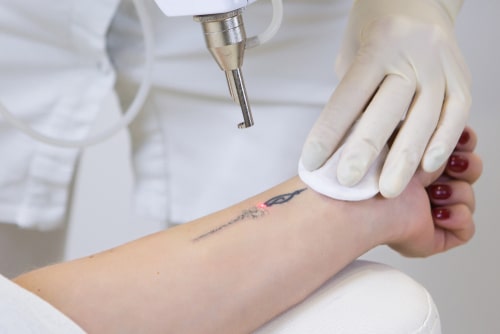Can Laser Tattoo Removal Cause Cancer?

Around 30 percent of Americans have at least one tattoo, with about 20% having more than one. Getting a tattoo is an extremely popular way to express your appreciation for body art. However, not everyone is satisfied after getting inked and may experience “tattoo regret.” Fortunately, there is an option available for tattooed individuals who wish to remove an unwanted tattoo in the form of laser tattoo removal.
Above all else, it’s important to visit a facility that employs a dermatologist who is skilled at laser tattoo removal. For patients near Farmington, MI, and surrounding areas, Farmington Dermatology is a top-notch facility known for impeccable results and patient care. Dr. David A. Baird is a board-certified dermatologist who specializes in laser tattoo removal and a number of other areas. Dr. Baird can alleviate your fears and answer all your questions during a consultation appointment.
How Does Laser Tattoo Removal Work?
Lasers are able to remove tattoos by breaking up the pigment colors through high-intensity beams of light. However, if you have tattoos with a lot of black pigment, such as blackout tattoos, they are more stubborn and may be more difficult to remove. Light-colored tattoo inks, such as white, green, blue, and neon colors may also be difficult to remove.
Prior to scheduling an appointment, you should first have a consultation with Dr. Baird so he can evaluate your tattoos and give you more information as to what to expect during the procedure. You may have to undergo several treatments depending on a variety of factors, including the size and color of your tattoo and your age and skin type. It’s important to note that your skin color and the depth of the pigment can also affect the laser tattoo removal technique used.
What to Expect During Treatment
During a laser tattoo removal session, you can expect the following:
- You will be given protective eyewear to shield your eyes from the laser.
- Your dermatologist will test your skin’s reaction to determine the most effective laser settings.
- The laser will deliver pulses of light to the tattooed skin, breaking up the ink particles.
Smaller tattoos require fewer pulses, while larger tattoos need more. Regardless of size, multiple sessions are necessary to fully remove the tattoo, with the ink lightening after each treatment.
Does Laser Tattoo Removal Hurt?
Most patients describe the sensation associated with the tattoo removal process as similar to a rubber band snapping against the skin. Local anesthesia, such as a numbing cream, is often used to minimize discomfort. After the procedure, applying an ice pack to the treated area can help reduce swelling and soothe the skin.
Possible Side Effects
While laser tattoo removal procedures are generally safe, some side effects may occur, including:
- Scarring: Although rare, scarring is possible, especially if aftercare instructions aren’t followed.
- Hypopigmentation: A lightened or whitish area on the skin may appear.
- Hyperpigmentation: The treated skin may become darker in some cases.
Selecting a board-certified dermatologist such as Dr. Baird can help minimize these risks and ensure proper care during and after treatment.
Laser Tattoo Removal and Cancer: What You Should Know
One common concern is whether laser tattoo removal can cause cancer. The answer is that laser tattoo removal does not directly lead to cancer. However, if a tattoo covers a suspicious lesion, laser treatments could potentially worsen an undiagnosed skin cancer, leading to an increased risk. Additionally, the procedure can make the skin more photosensitive, increasing the risk of sun damage. Using sunscreen after any form of laser therapy treatment can significantly reduce this risk.
It is important to note that there have been some rare malignant lymphoma cases diagnosed in people who have had laser tattoo removal. However, these cases are extremely uncommon and may be related to other factors.
It’s also worth addressing the concern of health risks related to tattoo ink. Reputable tattoo pigments will not contain toxic chemicals and have no known relation to cancer. If you are concerned regarding the ingredients in your tattoo ink or potentially toxic compounds, be sure to inquire with your tattoo artist.
Caring for Your Skin After Laser Tattoo Removal
Proper aftercare following laser removal of tattoos is essential for healthy healing and the best results. Follow these steps to care for your skin post-treatment:
- Keep the treated area clean and apply antibiotic cream to prevent infection.
- Use Aquaphor or Vaseline to keep the skin moisturized and minimize scarring.
- Avoid direct sun exposure and apply sunscreen to protect the skin.
Schedule a Consultation
If you’re considering having your tattoos laser removed, consulting with a board-certified dermatologist is the best way to understand your options. Dr. Baird and the team at Farmington Dermatology offer expert care and personalized treatment plans. Contact our Farmington office today by calling or filling out our online form to schedule your consultation.

